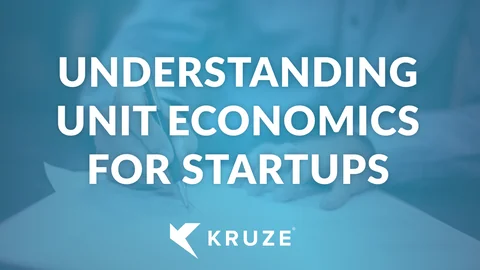
Unit economics measures the profitability of a startup on a per-unit basis, typically calculated as revenue minus costs for a single customer or transaction. It’s a granular way of looking at your business model, helping you understand if you’re making or losing money with each sale or customer acquisition. For venture-backed startups, strong unit economics show that your core business model is sound, and can become profitable as you grow, even if your company is currently operating at a loss due to growth investments.
The importance of unit economics
Unit economics are used to evaluate several aspects of a startup company, including:
- Profitability. Unit economics helps startups determine whether they’re making money on every sale or losing money, which helps with long-term sustainability.
- Scalability. Strong unit economics suggest that a business model can be profitable when scaled up, which is important for venture-backed startups aiming for rapid growth.
- Investment potential. Investors scrutinize unit economics to evaluate the financial viability and growth potential of startups. Demonstrating strong unit economics can increase your chances of securing funding.
- Strategic decisions. Insights from unit economics help make informed decisions about pricing, marketing strategies, and resource allocation.
Key components of unit economics
To calculate unit economics, we use four key metrics: Customer acquisition cost (CAC), lifetime value (LTV), CAC payback period, and the LTV/CAC ratio. Here’s how these metrics work together to provide insights into a startup’s unit economics:
- Customer acquisition cost (CAC). CAC represents the total cost of acquiring a new customer. It’s calculated by dividing the total sales and marketing expenses by the number of new customers acquired in a given period. So the formula is CAC = Total Sales and Marketing Expenses / Number of New Customers Acquired.
- Lifetime value (LTV). LTV estimates the total revenue a customer will generate over their entire relationship with the company. A common formula for SaaS companies is LTV = (Average Revenue Per Account × Gross Margin) / Churn Rate.
- CAC payback period. This metric shows how long it takes to recover the cost of acquiring a customer. It’s calculated as CAC Payback Period = CAC / (Monthly Revenue per Customer × Gross Margin). A shorter payback period is generally better, because that means you’re recovering your acquisition costs faster.
- LTV/CAC ratio. This ratio measures the relationship between the lifetime value of a customer and the cost to acquire them, and the formula is LTV/CAC Ratio = Lifetime Value (LTV) / Customer Acquisition Cost (CAC). A higher ratio indicates better unit economics, with a common benchmark being 3:1 or higher.
Using these metrics together
By regularly calculating, analyzing, and comparing these four metrics, startups get a comprehensive understanding of their unit economics.
- Profitability assessment. Compare LTV to CAC to determine if you’re making more from customers than you’re spending to acquire them.
- Growth efficiency. Use the CAC payback period to understand how quickly you can reinvest in growth. A shorter period allows for faster reinvestment.
- Scalability. A high LTV/CAC ratio (ideally 3:1 or higher) suggests a scalable business model.
- Optimization opportunities. Analyze these metrics to identify areas for improvement, such as reducing CAC or increasing LTV through better retention or upselling.
- Investment decisions. These metrics help in deciding where to allocate your resources for maximum impact on growth and profitability.
Improving unit economics
Many startups have poor unit economics when they first start out, but the best companies produce products that will quickly achieve solid unit economics. Here are some strategies to improve your unit economics:
- Optimize your customer acquisition. Focus on reducing CAC by improving marketing efficiency and targeting high-value customers.
- Increase your customer lifetime value. Implement strategies to improve customer retention and increase revenue per customer over time.
- Improve your productivity. Streamline operations to lower costs per unit, potentially through automation or process optimization.
- Optimize your pricinng. Experiment with different pricing strategies to maximize your revenue.
- Control your costs. Continuously monitor and control your costs, scrutinizing every expenditure to reduce costs without compromising quality.
Unit economics is a powerful tool
In a world that’s increasingly data-driven, unit economics are more important than ever. Founders need to be able to analyze and understand the profitability of each unit to maintain growth and attract investors. Remember, while many startups may start with poor unit economics, the goal is to quickly improve and gain traction.











